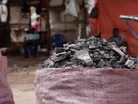FCA: Overwatch of social impacts from EV resource mining

Gone are the days of thinking that electric vehicles (EVs) are sustainable by association. The moment you begin to think that an electric car is responsible due to its lack of exhaust (tailpipe) emissions, you pass over some of the key concerns within the automotive supply chain.
We’ve seen already that all Scope emissions must be considered for a vehicle, and its maker, to achieve the coveted ‘net zero’ status, but is there enough consideration for the social implications within the supply chain of EVs—both old and new.
Mass production of materials like cobalt are susceptible to the same scrutiny of any industry. The Democratic Republic of Congo (DRC) is known to be the world’s leading source of mined cobalt—necessary for EV production, but also holding some concerns around the welfare of the employees that dig it up. With around 70% of the world’s supply, generally produced as a byproduct of copper and nickel, the focus is on the country to provide this critical material for a growing sector.
The Fair Cobalt Alliance (FCA) is a multi-stakeholder platform driving action in the cobalt supply chain. In particular, the organisation supports the notion of social justice in the working environment while the demand for resources increases exponentially due to changing sustainability trends.
The vision for the company is to align stakeholders in their contribution responsible for cobalt mining and maintaining the standards for the ‘S’ of environmental, social and governance (ESG).
As explained in an article by the Director of Business Innovation & Fundraising at the Impact Facility—who is also supporting fundraising and partnerships at the FCA—David Sturmes-Verbeek:
“One of the [FCA’s] three strategic objectives is increasing the incomes of artisanal miners and their wider community. Key to that strategy is ensuring fair value retention at the point of mineral sales.
“While artisanal mines are, on average, earning more than many other community members, most mine workers complain about the lack of advantage of their inability to accurately determine mineral content and value.”
An overview of cobalt mining concerns
Cobalt mining, particularly in the DRC, has raised significant social justice concerns:
Child labour: There are a number of allegations and documented cases of child labour incidents in the cobalt mining sector—specifically in the DRC—raising critical ethical and human rights issues.
Unsafe working conditions: Mining in the cobalt industry has been known to present unsafe working conditions to adults and children alike. The DRC needs to establish safer working environments in order for the entire supply chain to not only protect the people, but also ensure that the workforce can thrive in a growing environment.
Economic disparity: If it’s not safety or life that are the main concerns, the term slavery applies to the financial circumstances that workers are in. Miners must consider the inhumanity of the conditions, but also the returns that employees receive as a result of their work.
Depriving regions: There are cases where cobalt mining led to drastic social and economic changes in particular regions due to disparity, including social and environmental.
Monopoly means control: The sheer fact that the DRC controls a majority percentage of cobalt mining gives it the power to control the financial incentives and working conditions in the industry. In some areas, like Katanga's copper-and-cobalt belt, large, often state-controlled mining companies, such as Gécamines, exerted substantial control, potentially limiting economic diversification and local empowerment.
******
EV Magazine is dedicated to creating a global community of businesses, experts, and EV enthusiasts with comprehensive insights into automotive and the surrounding sectors.
For more EV insights check out the latest edition of EV Magazine and be sure to follow us on LinkedIn & Twitter.
You may also be interested in Sustainability Magazine and Energy Digital Magazine.
*********************************************
BizClik is a global provider of B2B digital media platforms that cover Executive Communities for CEOs, CFOs, CMOs, Sustainability Leaders, Procurement & Supply Chain Leaders, Technology & AI Leaders, Cyber Leaders, FinTech & InsurTech Leaders as well as covering industries such as Manufacturing, Mining, Energy, EV, Construction, Healthcare + Food & Drink.
BizClik – based in London, Dubai, and New York – offers services such as Content Creation, Advertising & Sponsorship Solutions, Webinars & Events.

